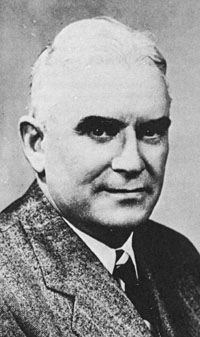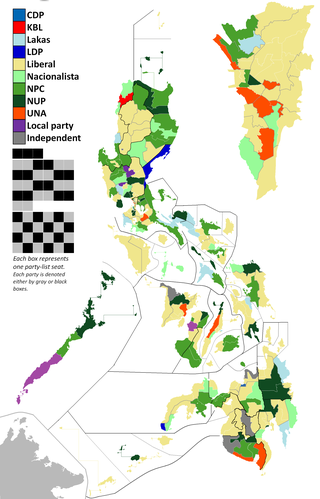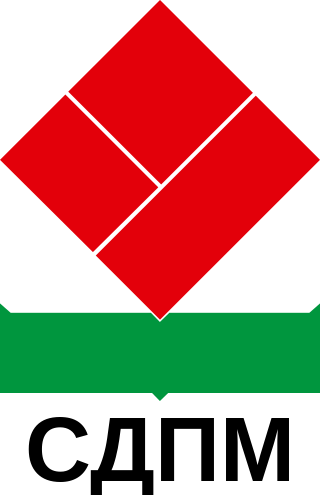
The House of Representatives is the lower house of the bicameral parliament of the Netherlands, the States General, the other one being the Senate. It has 150 seats, which are filled through elections using party-list proportional representation. Generally, the house is located in the Binnenhof in The Hague, however, it has temporarily moved to the former building of the Ministry of Foreign Affairs at Bezuidenhoutseweg 67 in The Hague while the Binnenhof is being renovated.
Vote splitting is an electoral effect in which the distribution of votes among multiple similar candidates reduces the chance of winning for any of the similar candidates, and increases the chance of winning for a dissimilar candidate. This is commonly known as the spoiler effect, which can discourage minor party candidacies.

The Green Mountain Peace and Justice Party (GMPJP), known as the Liberty Union Party(LUP) until 2021, is a political party active in the U.S. state of Vermont. It is a self-proclaimed "non-violent socialist party".

The United National Independence Party (UNIP) is a political party in Zambia. It governed the country from 1964 to 1991 under the socialist presidency of Kenneth Kaunda, and was the sole legal party in the country between 1973 and 1990. On 4 April 2021, Bishop Trevor Mwamba was elected President of UNIP.
The Social Credit Party of Saskatchewan was a political party in the Canadian province of Saskatchewan that promoted social credit economic theories from the mid-1930s to the mid-1970s.

The 1952 British Columbia general election was the 23rd general election in the Canadian province of British Columbia. It was held to elect members of the Legislative Assembly of British Columbia, alongside a plebiscite on daylight saving time and liquor. The election was called on April 10, 1952, and held on June 12, 1952. The new legislature met for the first time on February 3, 1953.

The Workers' Party is a socialist political party in Guinea-Bissau.

The Socialist Party of Guinea-Bissau is a political party in Guinea-Bissau.

The Guinean Civic Forum–Social Democracy is a political party in Guinea-Bissau.
The Christian People's Party is a minor political party in the Dominican Republic. It first contested national elections in 1986, when it was part of the Dominican Revolutionary Party-led alliance which lost to the Social Christian Reformist Party coalition. In the 1990 elections it formed an alliance with MIM, but received only 0.4% of the national vote and failed to win a seat. The party did not contest the 1994 elections, but was again part of a Dominican Revolutionary Party-led alliance in the 1998 elections. However, it switched its allegiance to the Social Christian Reformist Party for the 2002 elections. It had a candidate in the 2004 presidential elections, but they received less than 0.5% of the vote. In the 2006 elections it was part of the defeated Grand National Alliance. The party did not contest the 2010 elections.

In Australian politics, the two-party-preferred vote is the result of an election or opinion poll after preferences have been distributed to the highest two candidates, who in some cases can be independents. For the purposes of TPP, the Liberal/National Coalition is usually considered a single party, with Labor being the other major party. Typically the TPP is expressed as the percentages of votes attracted by each of the two major parties, e.g. "Coalition 50%, Labor 50%", where the values include both primary votes and preferences. The TPP is an indicator of how much swing has been attained/is required to change the result, taking into consideration preferences, which may have a significant effect on the result.
This article lists the British National Party's election results in the UK parliamentary, Scottish parliamentary and Welsh Assembly elections, as well as in the European Parliament elections and at a local level.

The 2013 Philippine House of Representatives elections were the 33rd lower house elections in the Philippines. They were held on May 13, 2013 to elect members to the House of Representatives of the Philippines that would serve in the 16th Congress of the Philippines from June 30, 2013 to June 30, 2016.
The Dominica Progressive Party was a minor political party in Dominica. It contested the 1985 general elections under the name Dominica Progressive Force, receiving only 78 votes (0.2%) and failing to win a seat. It changed its name prior to the 1990 elections, but received only 74 votes (0.2%) and again failed to win a seat. Although it did not participate in the elections in 1995 and 2000, it returned for the 2005 elections in which it put forward three candidates but failed to win a seat. In the 2009 elections it received only 24 votes.
The Republican Party was a political party in Jamaica. It first contested national elections in 1955, but received only 108 votes and failed to win a seat. It did not take part in elections in 1959 or 1962, but returned for the 1967 elections, in which it received only 45 votes. After failing to participate in the 1972, 1976 and 1980 elections it contested the 1983 elections, but received only 257 votes, again failing to win a seat. It did not contest any further elections.

The Paraguayan Humanist Party was a political party in Paraguay.

The People's Democratic Movement (PDM) was a centrist political party in Guyana.

The Guiana United Muslim Party (GUMP) was a Muslim political party in Guyana.

The Social Democratic Party of Macedonia is a political party in North Macedonia.

The Labour Party is a minor political party in Moldova led by Gheorghe Sima.











